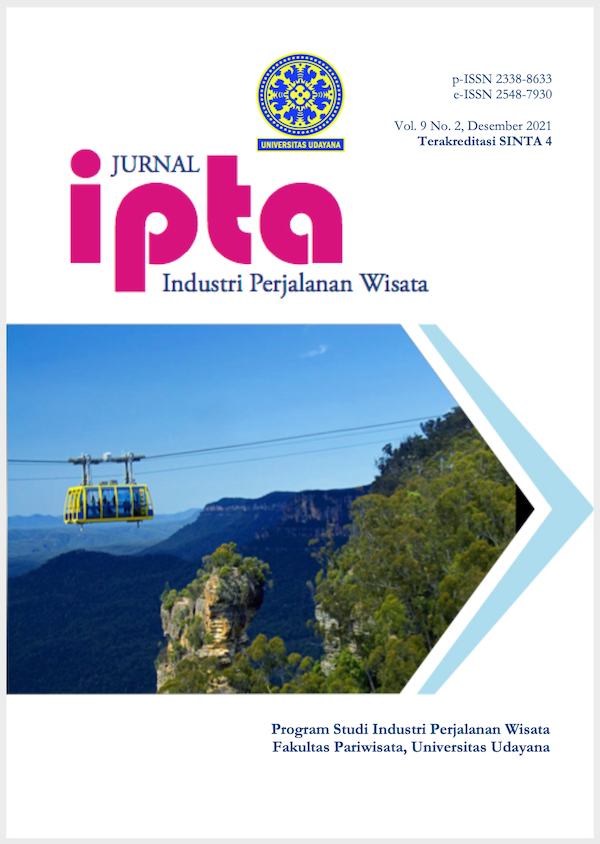MINAT GENERASI MILLENIAL UNTUK MEMBELI VIRTUAL TOUR
Abstract
The Covid-19 pandemic has an impact on the world of tourism due to restrictions on travel activities, resulting in the emergence of alternative virtual travel activities. Virtual tour activities are actually not new, but more popular during the covid-19 pandemic. As a new activity for travel industry needs, it’s need to do basic research for the for marketing activities in the future to be monetize by looking at the quality of service, level of satisfaction, and interest of millennial generation to buy this service. By using cross-tabulation method and descriptive analysis techniques the findings of this study that the quality of good service is in line with the level of satisfaction and interest of millennials to buy virtual tour activities in the future with a range of rp.10.000- Rp .50.000 in each activity. More research is needed to find out the right strategy in marketing virtual tour activities
Downloads
References
Anwar, T.A, Puspita Y.(2020). Public Intention on Banding Tour on Bus. JOINT (Journal of Information Technology), 2(1), 13-16.
Cho,Y.H, Wang,Y. Fesenmaie,D.R. (2002) Searching foe Experiences: The web-based Virtual Tour in Tourism Marketing. Journal of Travel and Turism Marketing, 12(4), 1-17.
El-Said, Osman and Aziz, Heba (2021). Virtual Tours a Meand to an End: An Analysis of Virtual Tours Role in Tourism ecovery Post COVID-19. Journal Of Travel Research I(21): 1- 16.
Hana, Kharis Fadlullah. (2019). Minat Beli Online Generasi Milenial: Pengaruh Kepercayaan dan Kualitas Layanan. Jurnal Bisnis dan Manajemen Islam. 7(2). 203.
Hidayatullah, S., Rachmawati, IK, Arosanto.E., Waris. Abdul, Patalo RG. (2020). Sistem Informasi Pelayanan dan Entrepenual Marketing serta kepuasan Generasi Millenilal Berkunjung ke Tempat Wisata. Jurnal Ilmiah Bisnis dan Ekonomi Asia. 14 (1). 74-83.
Huang YC., Backman S.J., Backman K.F. (2010) The Impacts of Virtual Experiences on People’s Travel Intentions. In: Gretzel U., Law R., Fuchs M. (eds) Information and Communication Technologies in Tourism 2010. Springer, Vienna. https://doi.org/10.1007/978-3-211-99407-8_46.
Namrata Bakre,A.D.(2017). Campus Virtual Tour. International Journal Of Advenced Research Computer Engineering and Technology. 444-448.
Prasetya, D.D.(2011). Aplikasi Virtual Tour Berbasis Web Sebagai Media Promosi Pariwisata. Seminar On Elctrical, Informatics, And Its Education, (hal.58-63).
Pladitama, R.(2015). Virtual Tour Pada Situs Trowulan Mojokerto Menggunakan Panorama 360 (Doctoral Disseration).Insitut Teknologi 10 November.
Sarwono, J. (2009). Statistik itu Mudah: Panduan Lengkap untuk Belajar Komputasi Statistik, SPSS 16. Yogyakarta: Andi Offset.
Sousa, R, Voss.C.A.(2009). The Effect of Service Failures and Recovery onn Costumer Loyalty in E-ServicesL An Empirical Investigation. International Journal Of Operation and Production Management.. 29(8), 834-864. https://doi.org/10.1108/01443570910977715.
Tjiptono, F. Chandra G. (2005). Manajemen Kualitas Jasa. Yogyakarta: Andi.
Wulur, H.W. Sentinuwo, S. Sugiarso, B. (2015). Aplikasi Virtual Tour Tempat Wisata Alam di Sulawesi Utara. Jurnal Teknik Informatika. 6(1).

This work is licensed under a Creative Commons Attribution-ShareAlike 4.0 International License.





